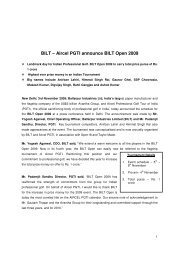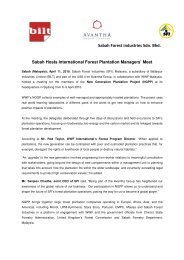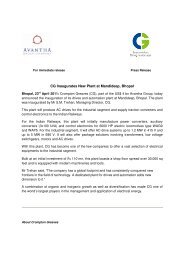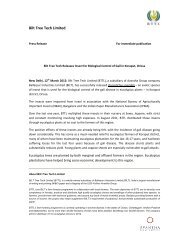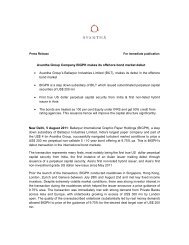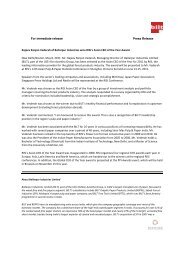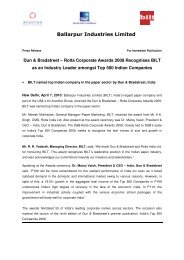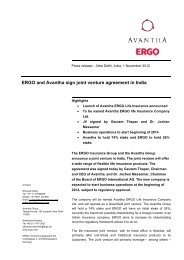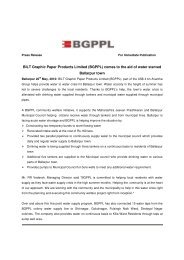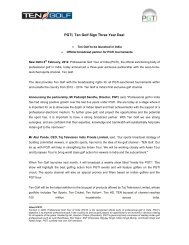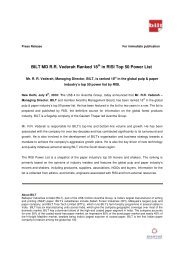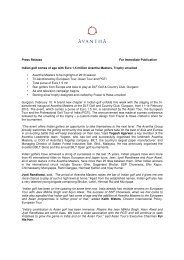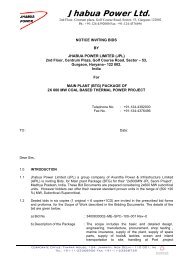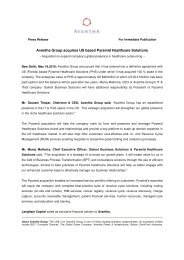Visions of Greatness - Avantha Group
Visions of Greatness - Avantha Group
Visions of Greatness - Avantha Group
Create successful ePaper yourself
Turn your PDF publications into a flip-book with our unique Google optimized e-Paper software.
<strong>Visions</strong> <strong>of</strong> <strong>Greatness</strong><br />
The rise <strong>of</strong> <strong>Avantha</strong> <strong>Group</strong> as one <strong>of</strong> the fastest growing business groups in the country belies<br />
its legacy. Though the conglomerate was formally launched just a year ago, its foundations<br />
were laid at the turn <strong>of</strong> the millennium. The Thapar <strong>Group</strong>, which was one <strong>of</strong> the biggest<br />
business houses at the time <strong>of</strong> independence, slipped away from public eye in the 1990s. But<br />
things changed dramatically after Gautam Thapar, the grandson <strong>of</strong> group founder Karam Chand<br />
Thapar, inherited a major share <strong>of</strong> the family empire from his uncle Lalit Thapar.<br />
Three years ago, the group launched its go-global drive by acquiring companies across sectors<br />
and continents. This is one <strong>of</strong> the main reasons behind the group’s success. Its global foray is<br />
ironical as the group patriarch, LM Thapar, vociferously opposed the liberalisation <strong>of</strong> the<br />
economy. After turning around Ballarpur Inds (Bilt) — India’s biggest paper manufacturer — and<br />
Crompton Greaves, Gautam Thapar slowly built up scale in all the businesses, which now<br />
straddle across pulp and paper, farm forestry, engineering, IT-ITeS, food processing, chemicals<br />
and power.<br />
The biggest change took place in 2005, when Crompton Greaves — which was a debt-laden<br />
loss-making company only a few years ago — made its first overseas acquisition. The e32-<br />
million (Rs 180-crore) buyout <strong>of</strong> Belgian firm Pauwels opened up the way for future acquisitions<br />
in the engineering space, and made Crompton Greaves the group’s flagship company,<br />
overtaking Bilt. It also catapulted Crompton Greaves among the top 10 global power transformer<br />
majors and set the base for it to become the first group company to enter the billion-dollar<br />
revenue club.<br />
The following year, the group went on a global acquisition drive. While Crompton Greaves<br />
struck its second deal by acquiring Hungarian power equipment maker Ganz, the Bangalorebased<br />
pickle making arm Global Green bought Belgian food processing firm Intergarden.<br />
<strong>Avantha</strong> also signed the biggest overseas acquisition deal in the paper space, when Bilt took<br />
over Malaysian pulp and paper major Sabah Forest for $261 million. This was followed by<br />
Crompton Greaves’ acquisition <strong>of</strong> Ireland-based Microsol in 2007 and that <strong>of</strong> French firm<br />
Sonomatra in June 2008. Global Green is close to finalising its second deal by acquiring a<br />
Hungarian firm, which will strengthen its position as one <strong>of</strong> the top pickle makers globally.<br />
The underlying theme <strong>of</strong> these acquisitions was to lap up underperforming or loss-making<br />
assets, which can add to the group’s global expansion strategy. This strategy has not only<br />
added revenues, but also enhanced the group’s global presence across markets, especially in<br />
Europe and South-East Asia. Now the group has a presence across 10 countries. The revenue<br />
<strong>of</strong> <strong>Avantha</strong> <strong>Group</strong> companies has grown from $1 billion five years ago to $3 billion today.<br />
Though only a few <strong>of</strong> the group companies are listed, together they are generating a net pr<strong>of</strong>it <strong>of</strong><br />
around $200 million, against $40 million in FY03.<br />
Now, with multiple M&A deals under different group firms, most <strong>of</strong> these companies are MNCs<br />
in their own right. However, multiple deals across geographies have their own complexities. As
<strong>Avantha</strong> <strong>Group</strong> Chairman Gautam Thapar says, “Acquisitions are sexy to talk about, difficult to<br />
see through and even more challenging to implement and integrate.” He adds that besides<br />
striking deals, he has also opted to walk out from some deals where valuations didn’t match up<br />
to the value <strong>of</strong> assets. The chairman has been ably assisted by the top management <strong>of</strong> his<br />
flagship group companies. He heads a four-member group management board, which includes<br />
the CEOs <strong>of</strong> Crompton Greaves and Bilt, SM Trehan and RR Vederah, respectively, besides the<br />
group CFO B Hariharan. This board also doubles up as an in-house M&A group, though in<br />
future, a focused team may be set up to advise on all deals for the group firms. A beginning has<br />
already been made with the group hiring Ash Gupta, former head <strong>of</strong> Honeywell India, as<br />
President, <strong>Group</strong> Strategy and Business Planning, who will hand-hold some <strong>of</strong> the smaller<br />
group companies.<br />
The group is now looking at scaling up businesses. These include negotiations for partnering a<br />
foreign insurance firm in India; extending the chemicals business to an ingredient supplier for<br />
pharma companies; besides venturing into capital-intensive power. However, the group has to<br />
tread cautiously after an indiscriminate diversification drive in the 1990s almost killed the Thapar<br />
flagship Bilt. Says Mr Thapar, “Things have changed. We were not very clear <strong>of</strong> what we<br />
wanted to achieve through some <strong>of</strong> the diversifications back then. Besides, there were<br />
differences in opinion within the management. Now there is a clear management vision.”<br />
But the target <strong>of</strong> reaching a group turnover <strong>of</strong> $10 billion and an m-cap <strong>of</strong> $25 billion by 2013 is<br />
a tough one. Mr Thapar agrees: “Different group firms have their own challenges. For Crompton<br />
Greaves, it is ‘what next’ It can look to acquire very big engineering firms, but they are not up<br />
for sale or will be very pricey. So, it may continue to acquire small and mid-sized firms, which<br />
will bring in new technologies for the company. However, in case <strong>of</strong> Bilt, the next step has to be<br />
big.”<br />
But <strong>Avantha</strong> may still need a new pillar, which can become a big revenue generator. If the<br />
group’s initiatives in the power sector take shape as planned, it can fill that gap. Though it will<br />
essentially be a domestic business, <strong>Avantha</strong> will look at acquiring coal mines in future.<br />
The journey won’t be easy as risks increase. However, if some <strong>of</strong> its group businesses match<br />
up to the efforts <strong>of</strong> other units, <strong>Avantha</strong> can replicate its revenue growth over the past five years<br />
to once again treble its size by 2013.



